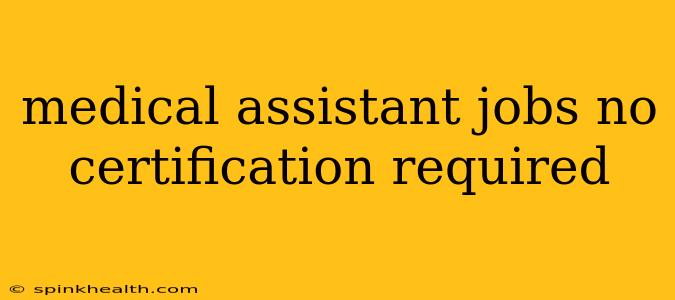The world of healthcare is vast and varied, offering a multitude of pathways for those passionate about helping others. For many, the allure of becoming a medical assistant is strong, offering a blend of patient interaction and medical procedures. But the common perception is that becoming a medical assistant requires formal certification. While certification is often preferred and can significantly boost career prospects, the reality is that several entry-level positions exist that don't demand it. Let's explore these opportunities and unravel the path to a fulfilling career in healthcare, even without prior certification.
What are the entry-level medical assistant jobs that don't require certification?
This is often the burning question. The truth is, the exact titles and responsibilities vary significantly by clinic, hospital, or practice. Instead of directly advertising "Medical Assistant" roles without certification, many healthcare facilities opt for positions that emphasize specific tasks or skills. These can include:
1. Medical Receptionist/Administrative Assistant:
Many clinics and doctors' offices need reliable staff to manage the front desk. This involves scheduling appointments, answering phones, handling insurance paperwork, and greeting patients. While it might not involve direct patient care like a certified medical assistant's role, it's a fantastic stepping stone. You'll gain invaluable experience in a medical setting, learning the workflow and terminology. This experience can later be leveraged to pursue certification or more advanced roles.
2. Medical Office Assistant:
Similar to a medical receptionist, this role often blends administrative duties with some basic clinical support. This might include assisting with filing, charting, and preparing patient rooms. While you won't perform complex medical procedures, you'll gain a broader understanding of the clinical environment than solely administrative positions.
3. Patient Care Technician (PCT):
PCT positions often exist in hospitals and larger healthcare systems. Their duties can range from taking vital signs and assisting with patient hygiene to stocking supplies and performing basic clerical tasks. While a PCT role might require some on-the-job training and might not always be explicitly advertised as "no certification required," the entry barrier is typically lower compared to certified medical assistant positions.
4. Home Health Aide:
While technically not strictly a "medical assistant" role, a home health aide position can provide invaluable experience in direct patient care. These roles often involve assisting elderly or disabled individuals with their daily needs, such as bathing, dressing, and medication reminders. The experience gained is transferable and demonstrable, enhancing your resume for future medical assistant roles.
What are the benefits of gaining experience before getting certified?
Gaining experience before getting certified offers several advantages:
- Real-world experience: This is arguably the most valuable asset. You'll learn practical skills, understand the daily realities of the job, and gain a clearer picture of your career aspirations.
- Networking: Working in a healthcare setting allows you to network with professionals, learn about various career paths, and potentially discover mentorship opportunities.
- Improved resume: Even entry-level roles boost your resume, making you a more attractive candidate when you later apply for certified medical assistant positions.
- Confirmed career path: Gaining experience can help you confirm whether a medical assistant career is the right fit for you.
How can I transition to a certified medical assistant role after gaining experience?
Once you've gained experience in an entry-level role, transitioning to a certified medical assistant role becomes significantly easier.
1. Identify certification programs:
Research and select a reputable certification program that aligns with your goals and schedule. Many community colleges and vocational schools offer affordable and convenient options.
2. Prepare for the certification exam:
Most programs provide comprehensive preparation for the certification exam, including practice tests and study materials.
3. Highlight your experience:
When applying for certified medical assistant roles, emphasize your previous experience, highlighting the skills and knowledge you've gained.
Frequently Asked Questions (FAQ):
Can I become a medical assistant without any training or experience?
While some entry-level positions may not require formal certification, gaining experience and education beforehand significantly boosts your chances of securing a fulfilling career. While finding a medical assistant job with absolutely no experience is rare, it’s not impossible, especially if you have transferable skills.
What kind of jobs can I get without certification in the medical field?
As detailed above, various roles exist that don't require formal certification, but it’s important to understand the scope of duties and whether those are aligned with your future aspirations.
Is certification required for every medical assistant job?
No, not every job requires certification. However, certified medical assistants typically have more opportunities and earn higher salaries. The need for certification depends on the employer's preferences and the specific job requirements.
In conclusion, while certification is a significant advantage in the field of medical assisting, it's not necessarily a requirement for entering the healthcare field. Numerous entry-level opportunities provide a valuable pathway to gaining experience, learning skills, and eventually transitioning to a certified medical assistant role. Your dedication, passion for patient care, and proactive approach to skill development are your most powerful assets.

